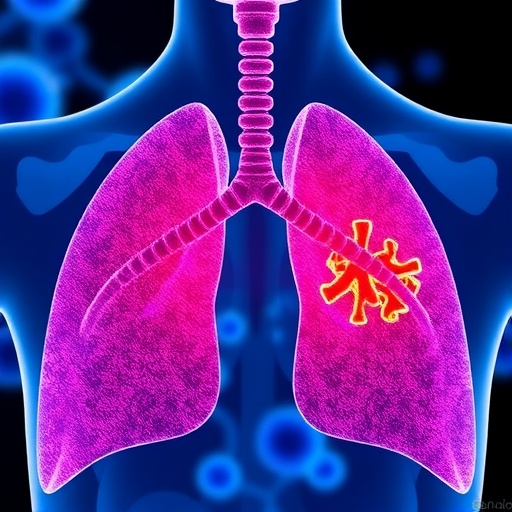
In an exciting development in the realm of cancer therapeutics, researchers have unveiled a novel antibody-drug conjugate (ADC) known as SC134-deruxtecan, specifically designed to target small cell lung cancer (SCLC). This type of lung cancer is notoriously aggressive, and patients often have limited treatment options. The introduction of SC134-deruxtecan represents a significant step forward in addressing the challenges presented by this devastating disease, which accounts for approximately 15% of all lung cancer diagnoses.
The innovative design of SC134-deruxtecan centers around the targeting of fucosyl-GM1, a glycolipid expressed on the surface of SCLC cells. By leveraging the unique properties of this target, the researchers aim to deliver a potent cytotoxic agent directly to cancer cells, thereby minimizing systemic toxicity and maximizing therapeutic efficacy. This specificity is crucial in oncology, where conventional therapies often result in collateral damage to healthy tissues. The ability to selectively target fucosyl-GM1 is a game-changer, as it paves the way for more effective and safer treatment protocols for SCLC patients.
The development of SC134-deruxtecan was underpinned by rigorous preclinical studies that provided a comprehensive understanding of its pharmacodynamics and pharmacokinetics. These studies revealed that the ADC exhibits favorable stability and a robust mechanism of action. Once administered, SC134-deruxtecan is designed to bind with high affinity to the fucosyl-GM1 antigen, triggering internalization and consequential delivery of the cytotoxic payload. This targeted approach not only enhances the drug’s effectiveness but also limits the exposure of non-targeted tissues to harmful side effects.
In clinical trials, SC134-deruxtecan has shown promising results, with participants experiencing significant tumor reductions and, in some cases, complete responses. In one key trial, patients treated with this ADC demonstrated prolonged progression-free survival compared to those undergoing standard chemotherapy regimens. This finding is particularly noteworthy in the context of small cell lung cancer, where treatment options are often limited and the prognosis is typically poor.
Moreover, the safety profile of SC134-deruxtecan appears to be favorable. During early-phase clinical trials, adverse events were reported but predominantly categorized as mild to moderate in severity. This aspect of the drug’s profile is particularly encouraging, given the challenging nature of SCLC treatment, which often comes with severe side effects associated with conventional chemotherapeutics. Patients have highlighted the tolerability of SC134-deruxtecan, which is a critical consideration for continued use in clinical settings.
Another striking feature of SC134-deruxtecan is its potential to overcome resistance mechanisms that have traditionally thwarted the effectiveness of other treatments. SCLC often develops resistance to standard therapies, leading to recurrence or progression of the disease. However, by specifically targeting fucosyl-GM1, this ADC has the potential to circumvent these resistance pathways, providing a glimmer of hope for patients who have exhausted other treatment options.
The research team behind SC134-deruxtecan emphasizes the importance of continued investigation into this ADC. Although the initial data is promising, the complexity of cancer biology necessitates thorough exploration of long-term effects and potential combination therapies that could further enhance its efficacy. The goal is to identify synergistic approaches that not only increase response rates but also prolong overall survival for patients battling small cell lung cancer.
In light of these findings, there is growing enthusiasm within the oncological community regarding the potential for SC134-deruxtecan to become a cornerstone in the treatment of SCLC. Contributions from multidisciplinary teams—including researchers, clinicians, and pharmacologists—are essential to optimize the therapeutic regimen and ensure that patients receive the best possible care. Collaborative efforts across institutions and within the pharmaceutical industry will play a pivotal role in advancing the clinical application of this ADC.
Furthermore, ongoing studies and trials will seek to elucidate the broader implications of SC134-deruxtecan in various stages of lung cancer, providing insights into its role not only as a treatment for established disease but also in the adjuvant setting. The hope is that this innovative therapy could lead to a paradigm shift in management strategies, inspiring further research into analogous targeted therapies that could benefit other malignancies.
As science progresses, the integration of advanced technologies such as artificial intelligence and machine learning in drug development and personalized medicine approaches may pave the way for even more breakthroughs akin to SC134-deruxtecan. These innovations could enhance predictive modeling for treatment responses and facilitate the identification of biomarkers, potentially optimizing patient selection for targeted therapies. Such advancements could be revolutionary, positioning not only this ADC but also future therapies as integral components of oncology.
In conclusion, SC134-deruxtecan epitomizes the evolution of cancer therapeutics, showcasing how a focused, research-driven approach can lead to significant advancements in the management of small cell lung cancer. With promising early results, an encouraging safety profile, and the potential to tackle resistance mechanisms, SC134-deruxtecan stands as a symbol of hope for patients and healthcare providers alike. As the scientific community continues to monitor its progress, there is optimism that this ADC will soon transition into practice, ultimately transforming the landscape of lung cancer treatment.
Subject of Research: The development of SC134-deruxtecan as a targeted therapy for small cell lung cancer.
Article Title: SC134-deruxtecan, a fucosyl-GM1 targeting ADC for small cell lung cancer therapy.
Article References: Heath, B., Kaira, B.G., Thakker, D. et al. SC134-deruxtecan, a fucosyl-GM1 targeting ADC for small cell lung cancer therapy. J Transl Med 23, 940 (2025). https://doi.org/10.1186/s12967-025-06940-2
Image Credits: AI Generated
DOI:
Keywords: SC134-deruxtecan, small cell lung cancer, antibody-drug conjugate, fucosyl-GM1, cancer therapy.
Tags: cytotoxic agent deliveryeffective lung cancer therapiesfucosyl-GM1 glycolipidlung cancer therapeuticsnovel antibody-drug conjugateoncology drug developmentpharmacodynamics and pharmacokineticspreclinical studies in cancerSC134-deruxtecanSCLC treatment optionssystemic toxicity reductiontargeting small cell lung cancer




